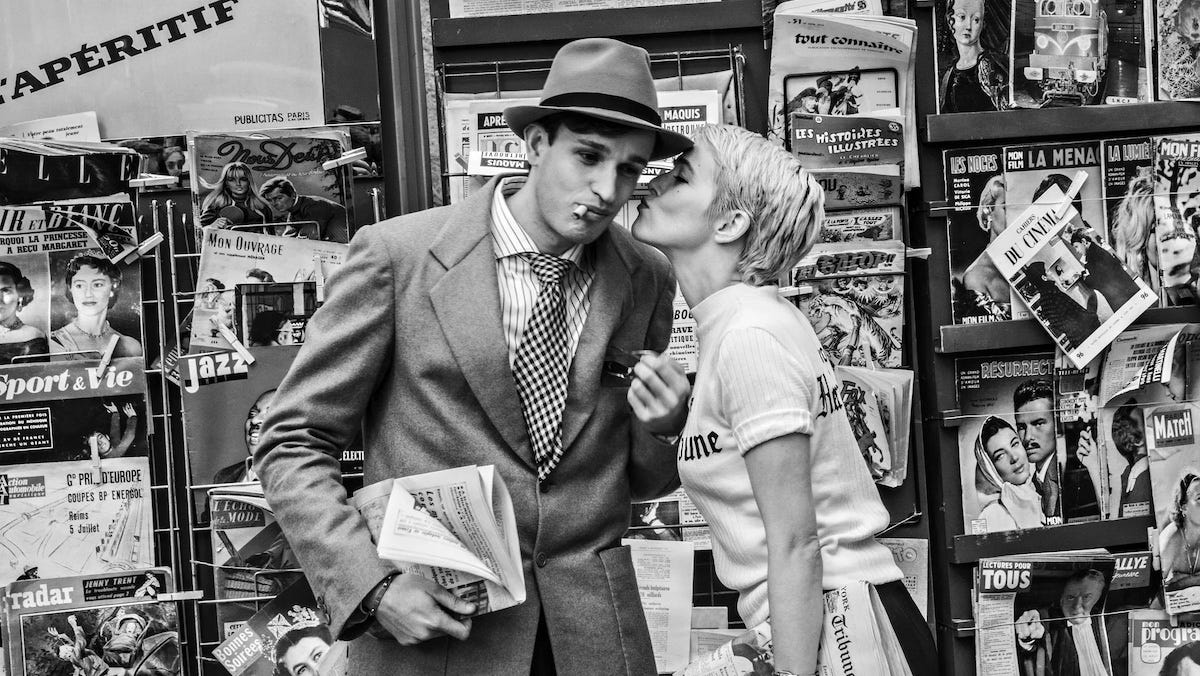LFF 2025: Nouvelle Vague
Second Richard Linklater film of 2025 is a gift for cinephiles
Festival Review: Nouvelle Vague (dir. Richard Linklater)
Plot in a nutshell
We’re in France during the late 1950s, and a community of cinephiles are making big waves. Jean-Luc Godard (Guillaume Marbeck) is eager to direct his first full-length feature and prove to the world (and himself) that the best way to criticize a film is direct one yourself. Financing, casting and shooting Breathless proves to be an artistic challenge, one that Godard embraces and escapes from, depending on the day, frustrating all those around him.
Richard Linklater directs a multi-pronged francophone ode to the French New Wave, Jean-Luc Godard, and Breathless (1960), Godard’s monumental feature debut that has since become synonymous with the entire Nouvelle Vague movement and one of the most influential films period. Fans of this popular era and the Cahiers Du Cinema gang who went on to become some of the greatest French filmmakers of all time (next to Godard, Francois Truffaut, Claude Chabrol, Jean-Pierre Melville et al.) will easily fall in love with Linklater’s adoring tribute.
It’s a cinephile’s wet dream version of “Who’s Who?” right from the start, as the names of all those in the inner and outer circle pop up in quaint title cards whenever any one of them appear in a scene. But Godard is the star and his personality is larger than life, arrogant, encyclopedic. A filmmaker with a God complex and an answer to every question in the form of a quote, dying to make his first film while his peers Truffaut and Chabrol already have a head start. How Breathless is conceived, financed, cast and shot is the engine of the film, with Marbeck as Godard and Zoey Deutch as Jean Seberg standing out from a packed and impeccably cast ensemble.
It’s fascinating to compare Nouvelle Vague to the other Linklater film about a self-obsessed real-life genius artist this year. It’s wild that the same director made both films which speaks to Linklater’s versatility and astuteness; in Blue Moon, the spotlight needed to be on Lorenz Hart so he can hog it in a chamber piece. Here, it’s more on the filmmaking process and the community, from which Godard emerges triumphant.
The look and feel of the film, draped in grainy Nouvelle black-and-white Vague, as if it’s a discovered artifact from an old, dusty cinephile vault, is an essential ingredient to the filthy charm. As are the cameos from the giants Bresson (Aurélien Lorgnier), Melville (Tom Novembre) and Rossellini (Laurent Mothe) who are full of advice on the burdensome, magical process of making movies. It’s all so cloyingly affectionate that it becomes a little, as Godard himself would have lovingly said, dégueulasse.



Bonjour, may we suggest you add the nouvelle film «French Lessons» to your watch list next, mon cher! 🧀 To find out how to watch just call +1-833-LRN-FRNC or email iamreadytolearnfrench@gmail.com 🫡